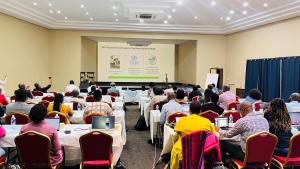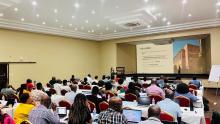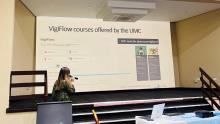Botswana Boosts Vaccine Safety with VigiMobile and AEFI SurveillanceTraining
Botswana has reached a key milestone in its efforts to strengthen vaccine safety surveillance, completing a national training program on Adverse Events Following Immunization (AEFI) data management using the VigiFlow and VigiMobile systems. This training marked a significant step forward in enhancing the country's capacity to ensure the safety and efficacy of vaccines while fostering public confidence in immunization programs. The training brought together participants from the Botswana Medicines Regulatory Authority (BoMRA), the Ministry of Health’s Expanded Program on Immunization (EPI), the WHO Country Office, and district EPI focal persons. Facilitated by experts from WHO’s regional offices and the Uppsala Monitoring Centre, the program showcased Botswana's commitment to adopting cutting-edge tools and methodologies for vaccine safety.
The program employed a two-phased approach, beginning with a Training of Trainers session for national officers. This phase equipped participants with the knowledge and skills necessary to cascade the training to all 27 districts in Botswana. District-level sessions focused on practical applications of VigiMobile and VigiFlow, reinforcing participants' understanding of vaccine safety surveillance and the crucial roles played by BoMRA and district AEFI committees. These sessions provided hands-on experience in reporting and managing adverse events, ensuring participants were well-prepared to use the tools. The introduction of VigiMobile has revolutionized Botswana’s AEFI reporting system. This mobile application allows healthcare professionals to report adverse events even in remote areas with limited internet connectivity. Offline data entry, synchronized with VigiFlow once connectivity is restored, ensures seamless and timely reporting.
Since its implementation, the system has already facilitated the reporting of 30 AEFI cases, improving the speed and accuracy of data collection while enabling prompt responses to safety concerns. Despite its success, the training also highlighted challenges that could hinder comprehensive AEFI surveillance. These include limited awareness of BoMRA’s role, gaps in district AEFI committee coverage, particularly in remote areas like Kgalagadi, and logistical constraints such as a lack of compatible devices and competing healthcare priorities. To address these challenges, several key recommendations were proposed. Regular refresher training on AEFI and Adverse Drug Reaction (ADR) surveillance will be essential to maintain high levels of competency among healthcare workers. Expanding access to VigiFlow for district-level focal persons is expected to enhance data management and reporting. Additionally, strengthened collaboration between BoMRA, the Ministry of Health, and district AEFI committees will ensure timely and effective responses to adverse events.
These measures reflect Botswana's commitment to safeguarding public health through robust vaccine safety systems. With sustained efforts and collaboration, the country is well-positioned to further strengthen its immunization programs and ensure the wellbeing of its population.




